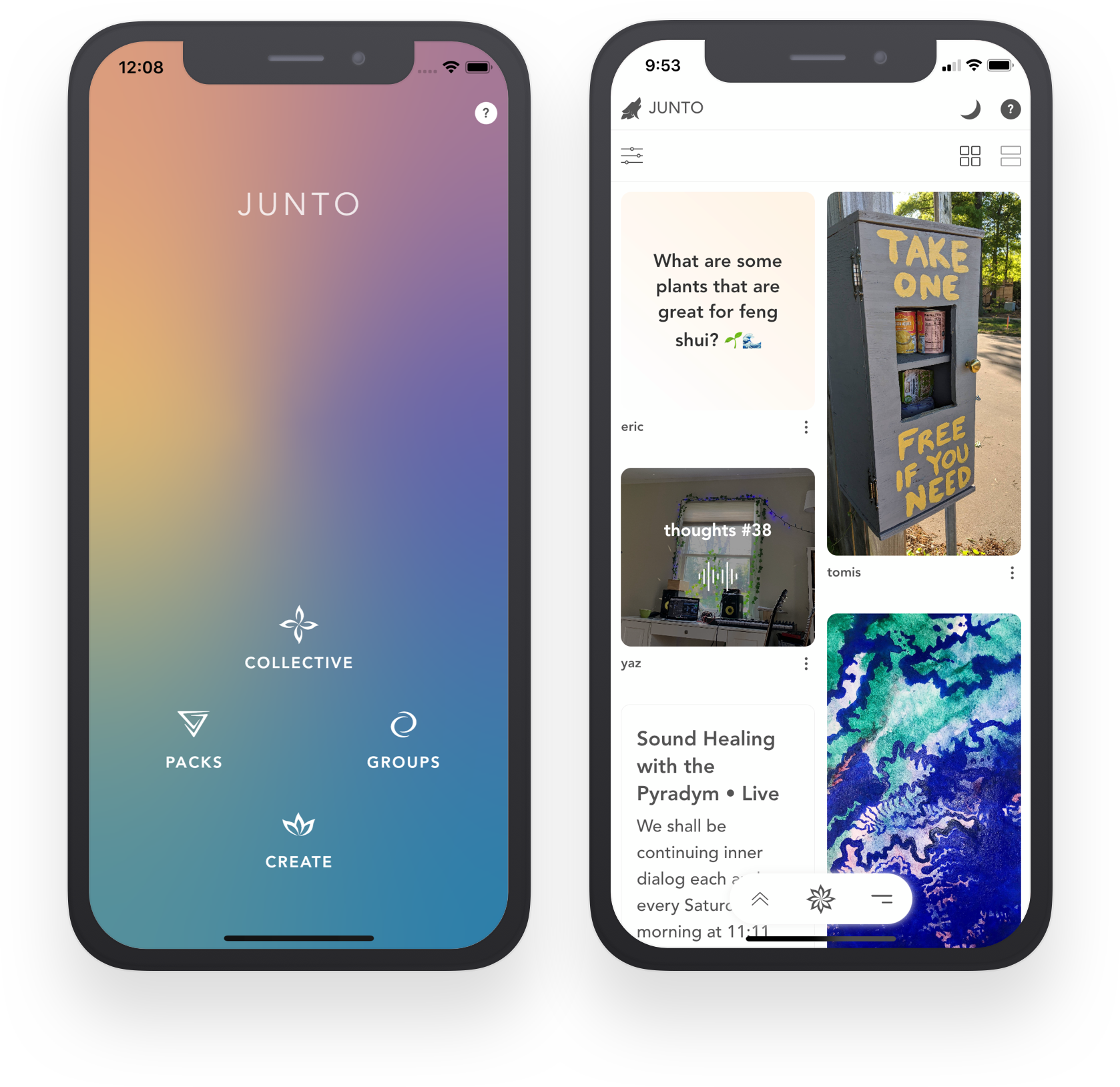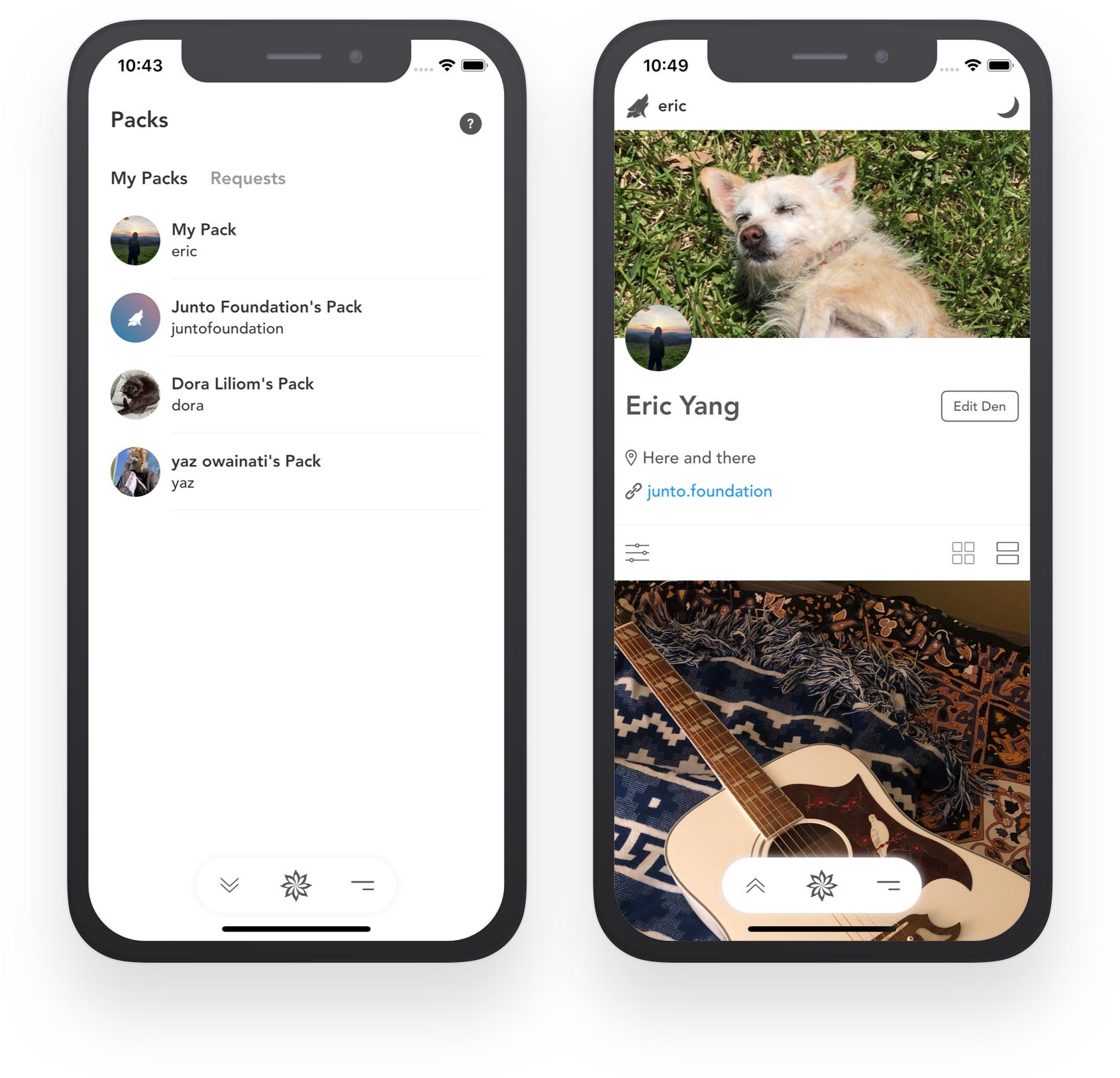To escape our "social dilemma" with the Net - both connecting and exploiting us - we need more mindful tech. Welcome to Junto
Netflix’s new documentary The Social Dilemma has been (well) grabbing our attention this week. It’s a mea culpa from a string of Silicon Valley tech bros (mostly bros) about how they (and their employers at Google, Amazon, Facebook, etc) consciously bent the internet over the last decade.
According to the narrative, the Net went from being a tool for democracy and information… to a matrix for inducing addictive and narcissistic behaviour. And on the way, the bros made astronomical fortunes selling the patterns of this behaviour to advertisers.
Still from The Social Dilemma
The doc featured a few of the voices we’ve curated here over the years - like Tristan Harris and Francois Chollet and Shoshana Zuboff. They’ve spoken to our interest in communities and localities using cyberspace to self-empower, by their critique of current designs.
Yet we had our problems with The Social Dilemma (apart from such an apparently critical take having such a massive production budget…) It seemed as if their conclusion was that this level of surveillance and data mining was like oil - a natural resource requiring major regulation at the state level, but otherwise unstoppable and permanent. Might this actually be quite congenial to the tech bros, who might easily rejoin these newly regulated corporations?
But also, there was no sense in the doc that alternative traditions and uses of “socio-technical networks” were growing and even thriving, over this ten year period. Open source and peer-to-peer, or civic, educative and deliberative tech, or decentralised practices coming from the establishment of blockchains, digital commons, platform cooperatives…
***
So as a direct answer to the “captology” and surveillance outlined in The Social Dilemma, we’re happy to present to you a new form of social network - one that point-by-point refutes Silicon Valley’s toxic model of interaction and usage.
Junto (pronounced june-toe, Spanish/Portuguese for “together”) is an exciting social platform arising from one of those “alternative” software approaches we have been interested in here for a while - Holochain (see our archive).
What Holochain promises is a fully functional social network, allowing creative interaction with your friends and peer, but which nevertheless maintains your absolute rights over the kind of information you share and retain (ie, it can’t be sold off to third parties/advertisers/governments).
Below are some screen shots from the Junto website, which convey the culture and aspiration of it directly:
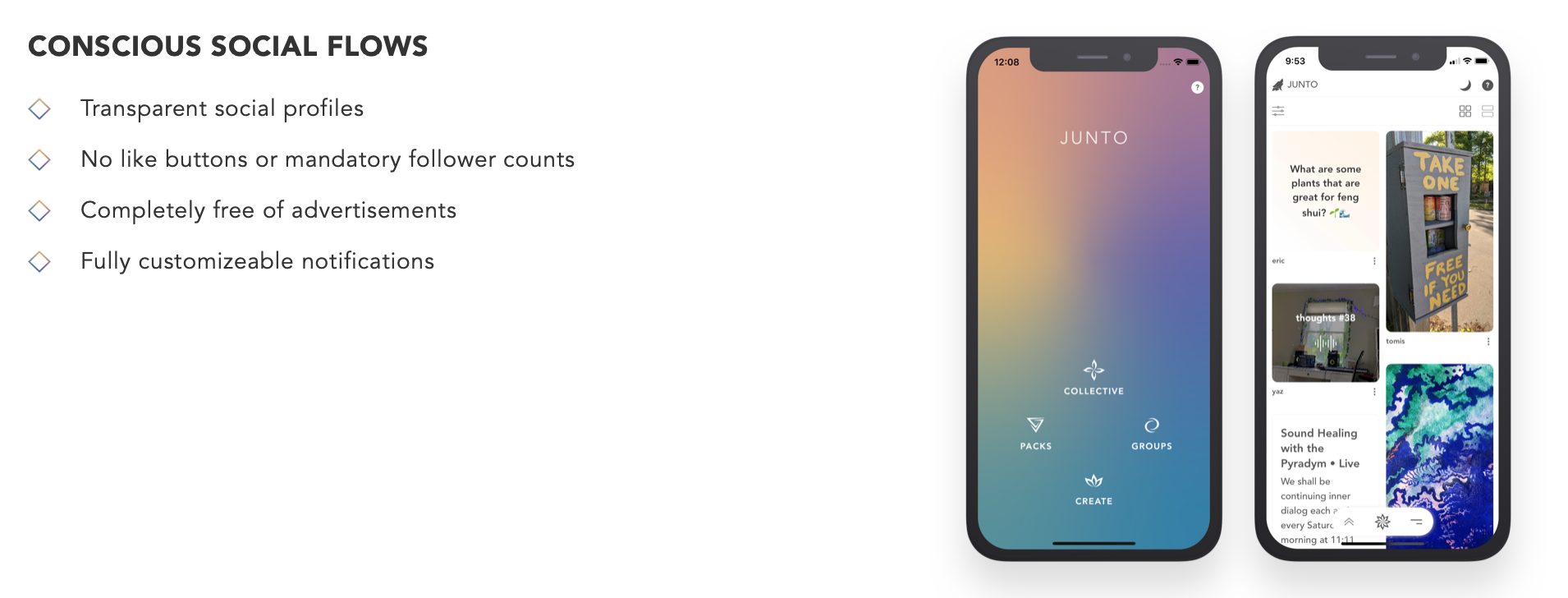
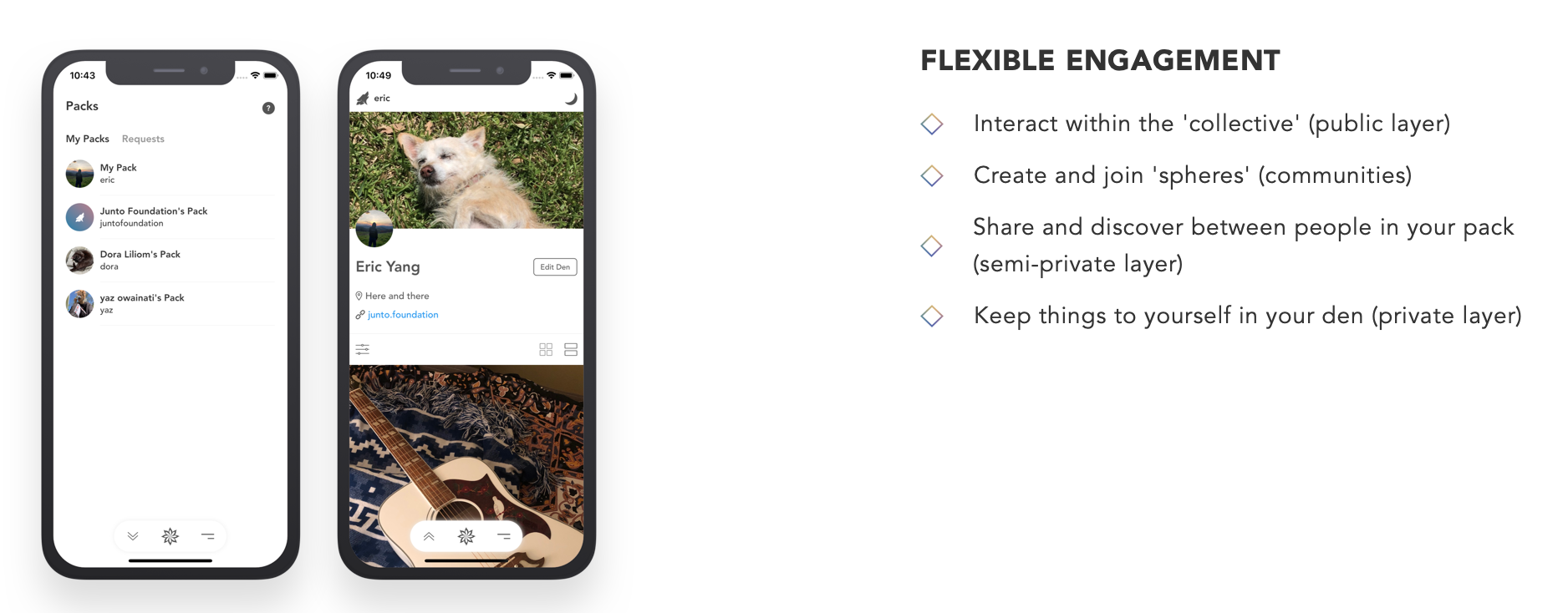
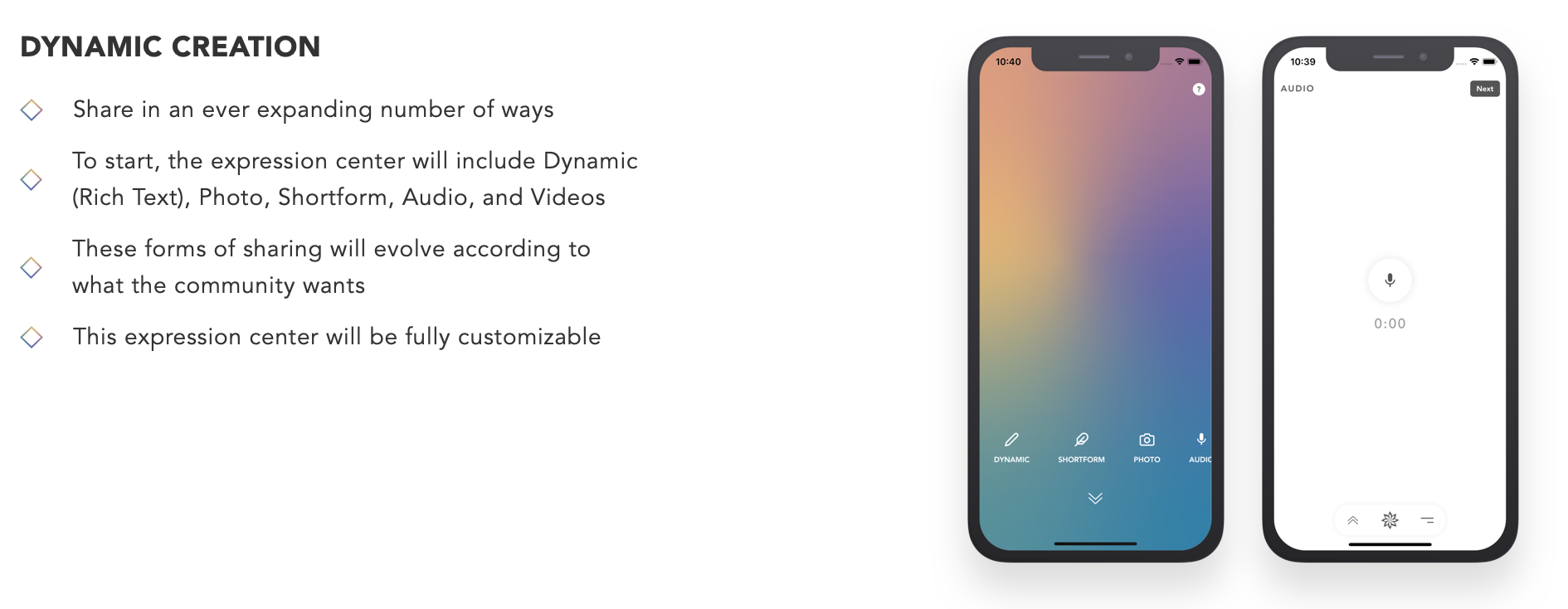
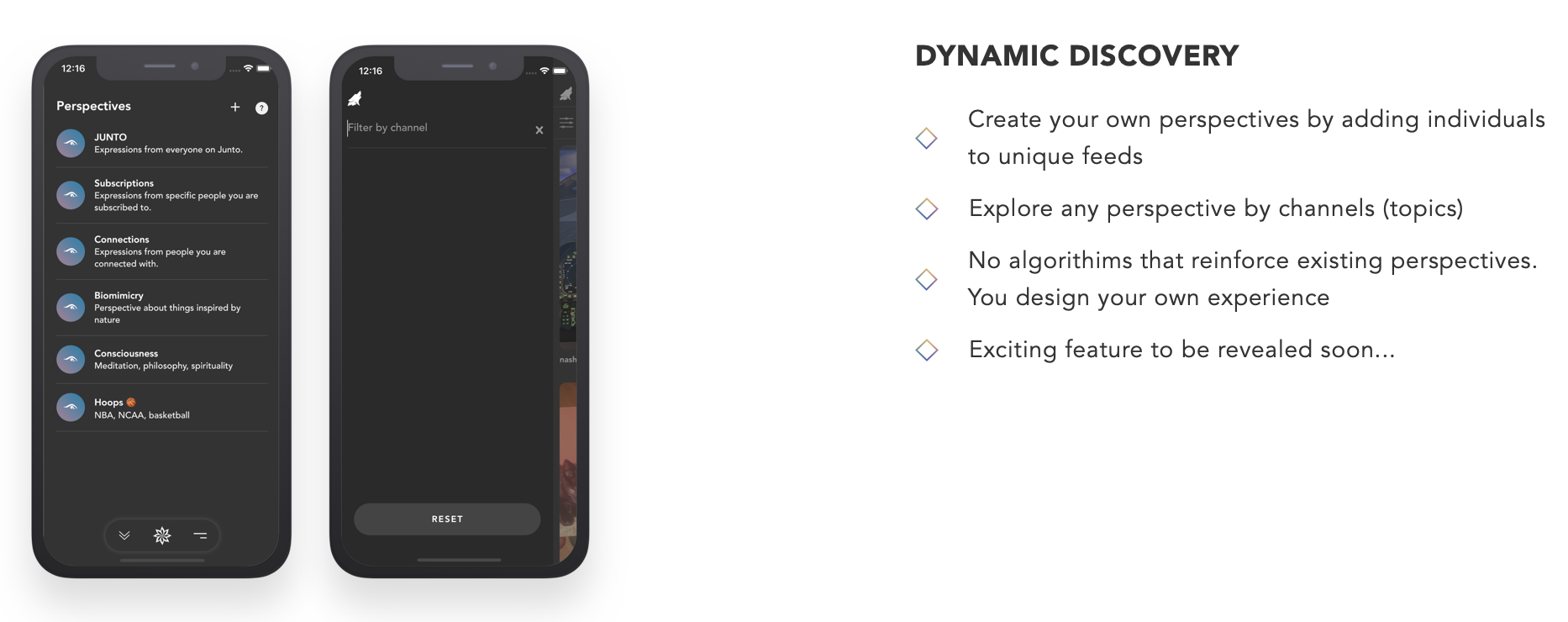
Junto very clearly states it is a non-profit organisation, and thus has no incentive to “monetize” your interactions. It also wants to promote a positive, wellbeing-oriented and balanced culture throughout the site - see co-founder Eric Yang’s “Rebalancing Our Relationship With Technology” blog.
There’s a post from 2018 which really gives a flavour of their cultur and ambition. An extract below:
Today’s social media? Resounding no.
Tomorrow’s? A very different story.
Junto is a team of six with a median age of 22. The projection of personal identity into online communities is something we (and you) are all-too familiar with.
In determining Junto’s direction, we’ve questioned the functionalities of various platforms and the extent to which they truly enrich our lives.
It seems that today’s digital world is at a tipping point.
Junto is a new social platform whose motivation is to inspire an atmosphere encouraging authenticity, collaborative creativity and free expression beyond current social standards.
With an interface designed from an entirely different ideology of network and social structure, we strive to cultivate an environment of depth and respect for our differences. No advertisements. Decentralized. Not for profit.
Side effects may include
mild to intense ease of social pressure
more mental space for the real you
and increased desire to learn about and engage with the world.
Online expression, without the numbers
What do all existing platforms have in common? A rating system. Some variation of the like button.
Every post we share faces the potential to receive a measurable quantity of reactions and, thus, validation.
Given that existing platforms depend on delivering a recurring endorphin rush, it’s easy to keep coming back for more. Relatable, yes?
As a result, an unwritten set of social rules has emerged, driving many to exist in preemptive and habitual self-censorship so as to safely satisfy the post likability status quo.
aaah please like my picture, it’s already been up for 3 minutes !!
Attention span, body image, friendship etiquette, online presence, etc.
If we set out to compile a list of every human behavior that’s been warped by what social media can feel like (at times, a hierarchical profile battlefield), we’d be able to go on and on and on and —
But was the adoption of this culture even in our control? What if there were no numbers attached to us? Imagine the state your mind could express from if forethought was never influenced by like-count.
Well, we’re about sick of idly posting up in Insecurity’s shady realm. Even a brief consideration of human nature’s confounding complexity provides enough evidence that, given the opportunity, an online social community where emphasis is placed on more than follower ratios can not only exist, but thrive.
Like buttons (and other numerical reaction counts) are, shall we say, not particularly fun, helpful or necessary.
So we’re replacing them with something totally different — a more engaging means to dynamically express non-verbally.
From automatic scrolling to self made exploration
Upon opening a social media app, we are immediately presented with a newsfeed:
Enter: Consume-content-mode. (Passively scroll to get a quick overview of things.)
Enter: Zombie Void.
Exit: A surprising amount of time.
Existing platforms financially rely on advertisers, who pay to reach you. As a result, your feeds are constructed with artificial intelligence (AI) to maximize ad reach. As you scroll, algorithms collect information about content you slow down for.
So… the next time you open the app (or one under the same parent company), similar loops of reinforced content appear at higher frequencies.
More of your time = more of their profit.
In the real world, perspectives are subjective matters that constantly evolve through personal experiences.
In this spirit, Junto is designed to enable dynamic and flexible feeds made by you. Since we’re not here for profit, we have no mission to keep you scrolling, no grounds to run ads, and no incentive to promote specific content.
Each time you open Junto, you are presented with a blank slate, encouraging global exploration that takes whatever form you choose in the moment. Our intention is that upon closing the app, your time spent will have been worthwhile and of substance unique to you.
Thank you, decentralization!
The majority of the internet is currently run using centralized network structures, which route and store data in one place. This means all personal information becomes property of the institution providing computing power.
Instead, Junto is built over a decentralized framework called Holochain. With this setup, no ownership or control of data flow can be limited to a single entity.
Simply put, we have no ownership of your data; thus, no means to track the informational trail you create while drifting and stumbling through various states of curiosity. We think it’s nice to know nobody’s peering over your shoulder. Digital empathy. [Check out this article to read more about our underlying technology and why it’s important.]
The potential of a nonprofit social network
Junto is funded completely by the people — independent of investors and third parties. Coming straight from the team creating this platform, money isn’t the point.
This movement fully embodies our intentions, which are purely fueled by a vision we’re dedicated to. Wikipedia did it!
Donations and revenue will be recirculated into both making Junto better and expanding its influence. And in the future, we plan to team up with others who are on a similar wavelength. (maybe you?)
Final Thoughts
Acting as the primary means by which the globe can connect, social media influences us every day. Collectively, it has become an extremely powerful force. And we’d really just like to see it used as the powerful tool we know it can be.
Here’s the cliffhanger: When sharing on Junto, you won’t have to be of high influence or following to be heard on a global scale. How? You’ll see.
When it comes to expressing, we’re going this way:
On-the-fly ideas
Creative pursuits
Fragmented thoughts
Raw & unlimited expression
Acting on inspiration
Observations & explorations
Independent learning
A range of perspectives
Collaboration
Want an answer to “the Social Dilemma”? Well, here’s one. Can’t say you didn’t know.
Click if you’d like to sign-up to be informed further, or financially support them, and here’s their FAQ.
Finally, here’s a short 12 second video from 6 months ago, showing the latest iteration of Junto’s app/mobile phone design.

